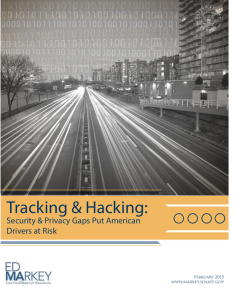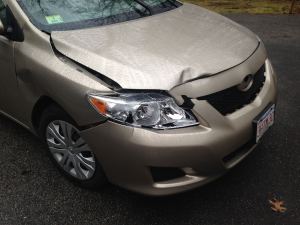Could this be the incident that finally gets everyone in the IoT industry to — as I’ve said repeatedly in the past — make privacy and security Job 1 — and to drop the lobbying groups’ argument that government regulation isn’t needed?
I hope so, because the IoT’s future is at stake, and, frankly, not enough companies get it.
I’m referring to the Chrysler recall last week of 1.4 million Jeeps for a security patch after WIRED reported on an experiment in which two white-hat hackers remotely disabled a Jeep on an Interstate from miles away, exploiting a vulnerable link between its entertainment and control systems. Put yourself in the place of reporter Andy Greenberg, then tell me with a straight face that you wouldn’t be out of your mind if this happened to you:
“As the two hackers remotely toyed with the air-conditioning, radio, and windshield wipers, I mentally congratulated myself on my courage under pressure. That’s when they cut the transmission.
Immediately my accelerator stopped working. As I frantically pressed the pedal and watched the RPMs climb, the Jeep lost half its speed, then slowed to a crawl. This occurred just as I reached a long overpass, with no shoulder to offer an escape. The experiment had ceased to be fun.
At that point, the interstate began to slope upward, so the Jeep lost more momentum and barely crept forward. Cars lined up behind my bumper before passing me, honking. I could see an 18-wheeler approaching in my rearview mirror. I hoped its driver saw me, too, and could tell I was paralyzed on the highway.
“You’re doomed!” Valasek [one of the hackers] shouted, but I couldn’t make out his heckling over the blast of the radio, now pumping Kanye West. The semi loomed in the mirror, bearing down on my immobilized Jeep.”
OK: calm down, get a cool drink, and, when your Apple Watch says your heart beat has returned to normal, read on….
But, dear reader, our industry’s leaders, assumedly knowing the well-publicized specifics of the Chrysler attack, had the hubris to still speak at a hearing of the Internet Subcommittee of the House of Representatives Judiciary Committee last week and claim (according to CIO) that that government regulation of the IoT industry wasn’t needed.
CEA CEO Gary Shapiro said in calling for government “restraint”:
“It’s up to manufacturers and service providers to make good decisions about privacy and security, or they will fail in the marketplace….. Industry-driven solutions are best to promote innovation while protecting consumers.”
Sorry, Gary: if someone dies because their Jeep got spoofed, the survivors’ attorneys won’t be content with the company’s failure in the marketplace.
There are some important collaborative efforts to create privacy and security standards for the IoT, such as the AllSeen Alliance. However, as I’ve written before, there are also too many startups who defer building in privacy and security protections until they’ve solved their technology needs, and others, most famously TRENDnet, who don’t do anything at all, resulting in a big FTC fine. There are simply too many examples of hackers using the Shodan site to hack into devices, not to mention academics and others who’ve showed security flaws that might even kill you if exploited.
One local IoT leader, Paddy Srinivasan of LoMein, gets it, as reported today by the Boston Globe‘s Hiawatha Bray:
“‘I think it is a seminal moment…. These new devices need a fresh approach and a new way of thinking about security, and that is the missing piece.'”
But it’s too late to just talk about self-policing.
Massachusetts’ own Ed Markey and his Connecticut counterpart, Richard Blumenthal, have called the associations’ bluff, and filed legislation, The Security and Privacy in Your Car Act (AKA SPY Car, LOL) that would require the National Highway Traffic Safety Administration (NHTSA) and the Federal Trade Commission (FTC) to establish federal standards to secure cars and protect drivers’ privacy. It would also create a rating system — or “cyber dashboard”— telling drivers about how well the vehicle protects drivers’ security and privacy beyond those minimum standards. This comes in the wake of the Markey study I reported on last Winter documenting car companies’ failure to build in adequate cyber-hacking protections.
Guess what, folks? This is only the beginning. Probably the only thing I’ve ever agreed with Dick Cheney on (ok, we agree it’s cool to have been born in Wyoming and that Lynne Cheney is a great writer), is that it wouldn’t be cool for the Veep to have his pacemaker hacked, so you can bet there will be legislation and regulations soon governing privacy and security for wearables as well.
As I’ve said before, I come at this issue differently from a lot of engineers, having earned my keep for many years doing crisis management for Fortune 100 companies that bet the farm by doing dumb things that could destroy public trust in them overnight. Once lost, that trust is difficult, if not impossible, to regain. Even worse, in this case, cavalier attitudes by even one IoT company, if the shock value of the results is great enough, could make everyone in the industry suffer.
So, if you’re arguing for no regulation of the IoT industry, I have just one suggestion: shut up,clean up your act and take a positive role in shaping regulations that would be performance-based, not prescriptive: the horse has already left the barn.
Now I have to check my Apple Watch to see when my heart rate will get back to normal.


